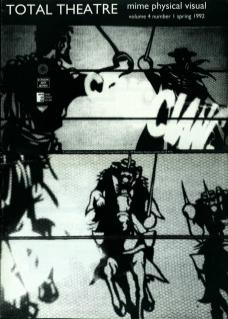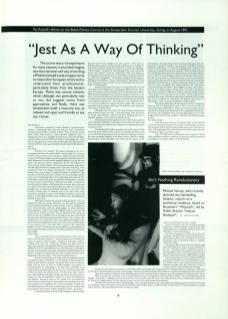The course was a rich experience for many reasons; it provided insights into the character and way of working of Polivka himself, it was an opportunity to meet other European artists and to understand their predicaments, particularly those from Eastern Europe, there was course content, which although not particularly new to me, did suggest some fresh approaches, and finally, there was Amsterdam itself, a favourite city, as relaxed and open and friendly as any city I know.
The Members
The course consisted of twelve members – six men and six women. Surprisingly there was not more for such a successful international performer as Bolek Polivka. There were two young mime artists from Russia; a rather gloomy Bulgarian actor, a Hungarian actress, two sprightly Spanish actors, four from Holland, and Pete Baynes and myself from Scotland. (Interestingly one of the Dutch contingent was a woman from Edinburgh who had married a Dutchman fifteen years ago and had lived and worked in Holland ever since.)
The Tutor
Polivka is no teacher. He doesn't pretend to be. In a newspaper interview he said he didn't want to teach or to criticize people, he just wanted to try out ideas. Many years ago I attended a course at Morley College in London run by the innovative director, Keith Johnstone. He was clearly using the group to try out his own ideas, and had no interest whatsoever in the development or achievements of the students. This incensed me greatly at the time, and although Polivka was doing more or less the same thing, I was surprised to find it no longer annoyed me. Some of the younger people did not get angry at being left sitting watching for long stretches of time because they wanted to be up and doing. Polivka had a way of choosing people to try out his ideas on the basis of who he thought would be the most successful at realising them, whereas the true teacher is duty bound to help the least likely as well as the most (Lecoq, for instance, will always make everyone ‘pass’ as he puts it, so that no one misses out on the experience). However, on second thoughts, the comparison with Keith Johnstone is not really valid because Polivka gave of himself and of his own talent most generously during the course, and he did give up time to watch and advise on individual acts that some students were developing and wanted to show him.
Although I enjoyed the general acting exercises, and was pleased to find my mime’s observant eye and gift for physical characterisation still stood me in good stead, I have no ambitions to be a solo performer and was quite happy to watch Polivka's demonstrations (which were quite brilliant) and to see how the various ideas worked out. There was no structure to the course. At times he was at a complete loss as to what to do next, and would wander about thinking or having another break. Then another idea would come, or he would tell a story, convulsing with laughter as he did so. At most a delightful man who can see the humour and absurdity in any situation, but at the same time is aware of the underlying sadness as well. I loved the way he pretended to speak Russian to the two girls from Moscow who were very shy and solemn but he made them laugh
The Content
The course began with a relaxed discussion on the nature of the jester in its historical context, i.e. having to amuse and entertain the master or mistress whilst living in a dangerous and tragic situation. I asked if he saw any connection between the jester and the Arlecchino character in Commedia dell'Arte. He said there were some similarities but the main difference was that Arlecchino, although a servant, was essentially a free spirit, whereas the traditional jester was always owned, like a dog (hence the collar and lead he wears at the beginning of his own show, The Queen and the Jester).
Over the next four days we examined and experimented with the different aspects of the jester, i.e., the animal; youth and age; the child; the fool and the madman. During the latter series of exercises, Bolek told the story of how he avoided military conscription in Czechoslovakia by pretending to be mad. The authorities were suspicious because they knew he was an actor, but he got away with it. He never had to do military service. His tale about other inmates were both hilarious and tragic. All the exercises were spontaneous – he gave no time for preparation, which was at times frustrating and very difficult. However, many of the results were successful and reached a level of performance, due mainly to the Spanish actors who were experienced and gifted with comic personalities. I learnt a lot from learning about their subtle and deadpan way of reacting to the most extreme provocation. Polivka laughed at them a great deal.
It was interesting to note how little language mattered in this physical/visual work. English was only natural to Pete and me, Polivka had to search for words and the others were very halting, so when they needed to speak they tended to use their own language. It didn't matter, because the real meaning of the scene was in the action and reaction. Everyone understood what was going on. Another great point of interest to me was Polivka's insistence on what he called the ‘changement’ – the physical changes which register a shifting in the situation. I always emphasise the importance of this factor in my own classes and the course certainly gave me some new ways of achieving this.
Another important point that was demonstrated over and over again was the significance of playing on different levels. All too often actors play on one persistent level and this becomes tedious. Motivations and feeling are very mixed in any given moment, i.e., the jester is tired and afraid but he tries hard to be funny and entertaining not only because that is what his master wants but because he needs to be praised and petted. Or the audience is very bored but tries to cover up its boredom by being excessively polite. This scene was extremely funny and gave full scope for Spanish facial expression.
The Queen and The Jester
Although I have seen this show in the London International Mime Festival some years ago, I took advantage of the fact it was on in the Felix Meritis Summer University building and free to enrolled students. I saw it twice during the week.
Normally I do not like performers who confront the audience in the Old Music Hall style, but Polivka does it with such charm, and with such artistry, he enhances the character he is playing rather than coming out of it.
His miming of the eagle is superb, and so is the sequence with the hobby horse when it tries to go in the opposite direction to the one in which the jester wants it to go (reminiscent of Jacques Tati and his early equestrian displays in the Mime Circus). Polivka certainly demonstrates all the principles and tenants of the course in this performance. Amongst all the comic business and laughter there are moments of genuine hostility, and genuine tenderness between himself and the Queen, so well acted, grabbing the audience with moments of real drama every now and then – such as when he mimics the old decrepit King for the amusement of his mistress, she laughs and then turns on him in fury for daring to ridicule her husband, and we realise that she is just as much a victim as the Jester. It was so interesting to learn that this show became a cult in Czechoslovakia because people identified with the Jester as a symbol of fun and creativity in conflict with the forces of rigidity and authoritarianism; the bird theme expressed freedom for them – the struggle to remain a free spirit in the face of a military regime. All this never occurred to me the first time I saw it in London. After the revolution, someone said to Polivka: ‘What shall we do now there is no enemy?’ All the Easter Bloc people felt the same. Art had been subversive and political for so long they felt lost without the repression. But Polivka said, ‘Now it is Nationalism. There is always something to fight against.’
The whole philosophy of this unique artist was summed up when he said: ‘It is important not just to show what you can do, but to remain creative and sensitive. If you stop trying to create, you may become less sensitive and hardened by the competition, the money, the success, the corruption.’ Easy to say perhaps when you are at the height of your success, but somehow, I think he will always manage to do it.
The Mime Centre
Once the course was over, I visited the Mime Centre and had a two-hour discussion with its director, Ide van Heiningen, about the development of the EMF European Mime Federation, which met on 13-15 September 1991, and on his recent visit to London, but this is really the subject of another paper.
(Note: The EMF will be holding their next congress in Berlin 1992, hopefully to hold the Conference in the autumn. Further details will be published in another edition of Total Theatre.)

